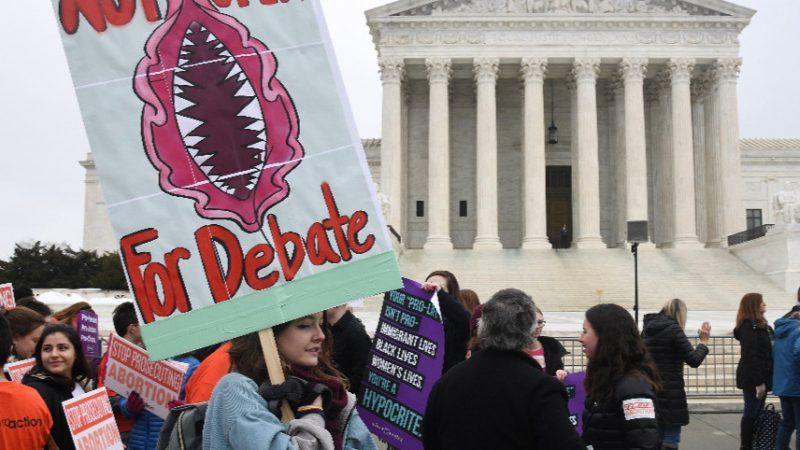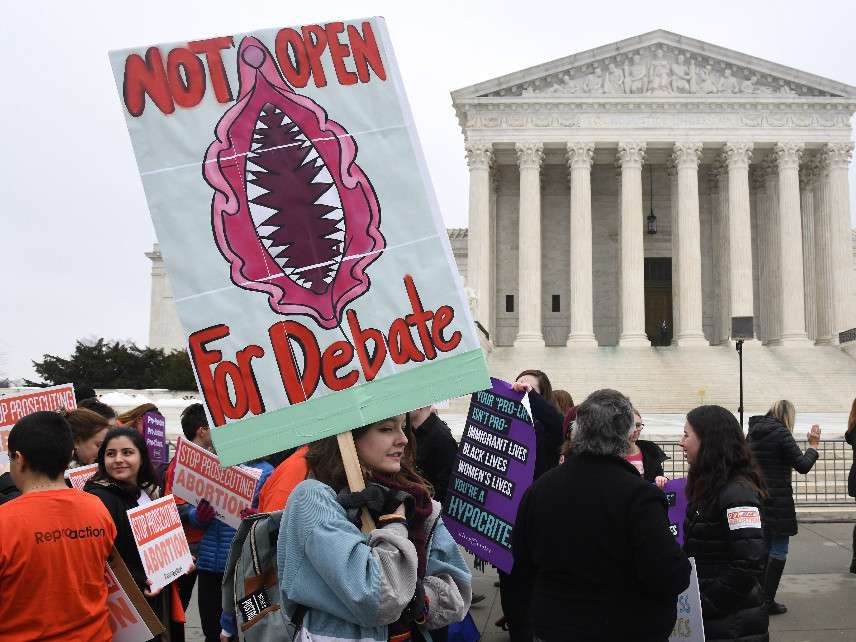Kavanaugh Gives Mixed Signals in First Supreme Court Abortion Ruling
In a 5-4 decision, the Court issued a temporary stay of a Louisiana law that could put abortion doctors out of business.


"The Supreme Court just placed Roe v. Wade on life support," says the headline at ThinkProgress. Going from that title, you might find it hard to guess that the Court just handed down a ruling in favor of abortion access.
In a 5–4 decision, the Court temporarily blocked a 2014 Louisiana law that, by instituting a strict hospital admitting privileges system, would have left the state with just one doctor allowed to perform abortions. Chief Justice John Roberts sided with more liberal justices in moving to stay the law. The case now faces a full hearing.
SCOTUS struck down a similar Texas law in 2016.
"Under recent Supreme Court precedent, the law is pretty clearly unconstitutional, and Roberts doesn't want to overturn that precedent until the court has considered the case, June Medical Services LLC v. Gee, in detail," explains Noah Feldman at Bloomberg. It's not clear which way Roberts will go ultimately.
Much is being made of the most recently confirmed justice, Brett Kavanaugh, voting with the minority and writing his own dissent. But even that isn't quite the anti-abortion radicalism many are making it out to be.
Louisiana currently has three abortion clinics and four abortion doctors, only one of whom has the admitting privileges required by Louisiana's (yet to be enforced) law. Kavanaugh's opinion argues that if the other three doctors aren't able to get admitting privileges, that could present an "undue burden" to abortion access (the standard set up under Roe v. Wade and recently affirmed in the Texas case, Whole Woman's Health v. Hellerstedt). But first, suggests Kavanaugh, the doctors should try to get admitting privileges. If they can, he writes, "the Louisiana law as applied would not impose an undue burden."
"The true issue in determining undue burden shouldn't be whether the four doctors who currently perform abortions can keep on doing so," writes Feldman. "Rather, the question should be whether the Louisiana law confers any benefits relative to the cost imposed on abortion. And the reality is that requiring the doctors to have admitting privileges doesn't confer any real health benefits."
Still, Kavanaugh could have said nothing, like the other three justices in the minority. "That would have signaled he was prepared to overrule the 2016 precedent" set in Whole Woman's Health, writes Feldman. Instead, Kavanaugh's opinion suggests "that he takes the precedent seriously as currently binding law."
Somehow, from all of this, The Nation's headline writer concludes that "Brett Kavanaugh Is Already Done Pretending He Respects Abortion Rights" (subhed: "And Susan Collins is to blame"). Ian Millhiser of ThinkProgress thinks "the only realistic uncertainty is whether [the Court] will gut Roe in one fell swoop, or by a thousand cuts." Another ThinkProgress headline states ominously and confusingly: "Hope is all that's left, with Roe v. Wade in Louisiana."
Some writers on the right are also (and more understandably) seeing dire omens in the Court's decision this week. "When Justice Roberts joined the court's progressives to grant the emergency stay and temporarily block Louisiana's law while the case is pending before the Supreme Court, he did more than benignly push pause on the enforcement of the Louisiana law," writes David French at National Review. "Emergency stays are granted only when—among other factors—'there exists a significant possibility of reversal of the lower court's decision.'"
"Multiple pro-life activists were initially pleased that not only did Justice Kavanaugh join Justices [Neil] Gorsuch, [Clarence] Thomas, and [Samuel] Alito in voting against the stay, but Kavanaugh actually penned a short dissent," French continues. "But if you read the dissent, it's on the most narrow possible grounds. Essentially, he argues that there isn't yet any evidence that the Louisiana law will have any immediate effect on abortion access."
As with the justice's record on birth control, while Kavanaugh is sure to make many decisions that Democrats (and others) don't like, he probably isn't an ideologue or inclined to be an agent of radical changes.

Show Comments (24)